Girls Aloud: It's 20 years since pop greats were born on Popstars The Rivals
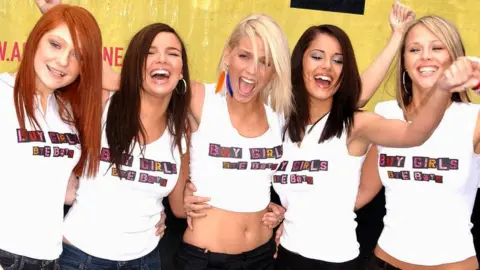 PA Media
PA MediaCast your mind back to 2002. The country was celebrating the Golden Jubilee of Queen Elizabeth II, the Commonwealth Games were held in Manchester, and Davina McCall was live on ITV1 with some important news.
"Here is the line-up that you have chosen for your girl band," she told viewers of Popstars: The Rivals.
It was 30 November, and a band was about to be formed on reality TV.
The group would be called Girls Aloud, and the public decided it wanted Cheryl Tweedy, Nicola Roberts, Nadine Coyle, Kimberley Walsh and Sarah Harding to fill the gap in the music industry left by the Spice Girls, and "to take on the boys" - One True Voice.
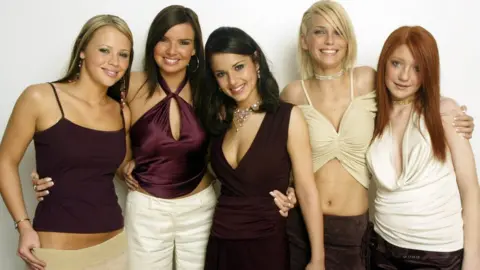 Getty Images
Getty Images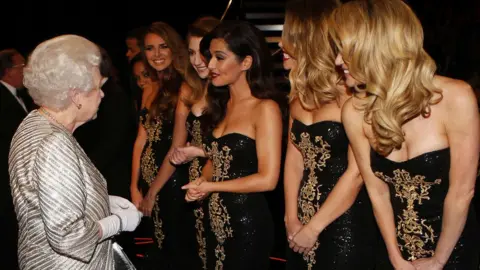 AFP
AFPIt was a simple TV talent show concept: wannabe singers hoping to be part of two rival groups (the boys and the girls), with judges whittling auditionees down to 10 contenders for each group before letting the public eliminate a performer each Saturday until there were two bands of five left battling it out for 2002's Christmas number one.
"Sound of the Underground was a life changing song for myself and Girls Aloud," Kimberley tells BBC News. "We knew we had hit gold when we heard it for the first time."
What the public didn't know then: it had chosen five women who would break the pop mould and score more hit singles than any other girl group in UK chart history.
Allow Google YouTube content?
To mark the 20th anniversary of their debut, Sound of the Underground, the group are releasing it on vinyl, along with an alternative vocal arrangement. The profits will be donated to The Sarah Harding Breast Cancer appeal - in memory of the 39-year-old band member who died from the disease last year.
In a 2002 review, the BBC claimed the song promised "a pleasantly surprising antidote to all the worst post-office party hangovers, with enough oomph to blow those cobwebs away".
"It's amazing, it was our first single 20 years ago and it's still one of our most popular, and most played songs," Kimberley says.
"We're all very proud of it and it means a great deal to us."
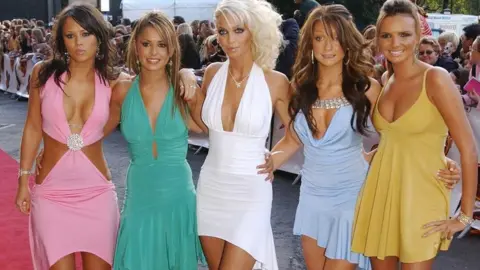 PA Media
PA Media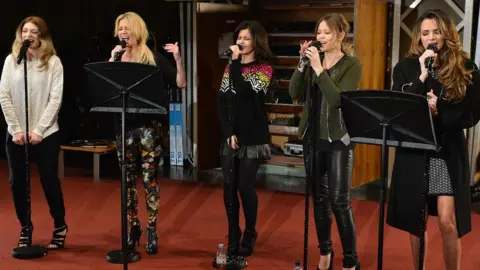
For years, Saturday morning children's TV was dominated by the band as they performed hit after infectious hit - like No Good Advice, Wake Me Up, Biology and Something Kinda Ooooh.
But it was an unlikely choice by the Arctic Monkeys, four days before their debut album was released, to cover the group's single Love Machine in 2006 that brought a whole new audience to Girls Aloud.
"It captured everybody's imagination," Jo Whiley, who hosted BBC Radio 1's morning slot at the time, said in 2018. "Listen up for Alex's laugh. It's my favourite moment in any Live Lounge."
Frontman Alex Turner told the BBC last month he couldn't remember how it came about - but the two genres of music could be closer than you think. Xenomania, the producers who worked on most of Girls Aloud's hits, told the BBC last year "pop music was on its knees" in the early '00's, but the group became "part of why the world sounds the way it is now".
Music promoter Luke Joynes put forward the case that Girls Aloud should be celebrated as a guitar band in this comprehensive Twitter thread.
Allow X content?
"Pop groups like Girls Aloud paved the way for guitar sounds to be more mainstream back then," Joynes believes. "The more you listen to them, the more you realise how different they sounded to newer girl groups like Little Mix and Fifth Harmony."
Girls Aloud blurred the lines of what was cool and what pop music should sound like. Nobody would have thought Coldplay would invite some reality show winners to support them on tour. But, along with Jay-Z, Girls Aloud got the crowd in the mood at Wembley Stadium in 2009, with Chris Martin declaring they were "the ultimate form of life".
Away from the riffs, lyrics and choreography, there was something about the group that simply represented the mid-noughties in pop, when everything was a bit freer: an era of polyphonic ringtones, charity bracelets and gel pens.
E4 series Girls Aloud: Off The Record followed the band around the UK and in Australia. In the age of cancel culture, it's now hard to imagine any chart-topping act daring to let cameras film as they argued with wardrobe staff, dealt with hangovers and complained about the lack of industry recognition.
It's one of the reasons clips from the fly-on-the-wall series do so well on TikTok now. People aren't used to pop stars being so honest. Chunks of the documentary are also used in the Gals Aloud drag show.
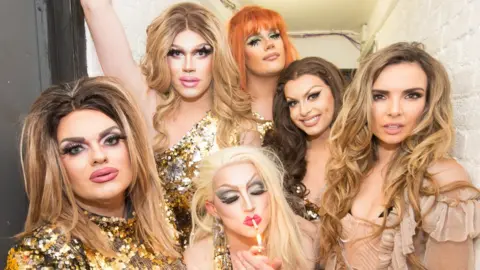 Corinne Cumming
Corinne Cumming"They really formed and shaped me to be the artist I am today," Drag Race star Cheryl Hole says. "For a lot of us, Girls Aloud will never not be a thing in our lives. It's the soundtrack to our childhood and I will make sure the next generation know all the choreography to The Promise."
Seeing Gals Aloud is likely to be the closest a fan can get to seeing the Biology, Can't Speak French and Untouchable singers on stage, because the band split in 2013.
A 20th anniversary tour was in the works but, following Sarah's death last year, the other four members have made clear they don't feel comfortable performing without her. Instead, they have been hosting events to raise money for cancer treatment, including a Race For Life this summer.
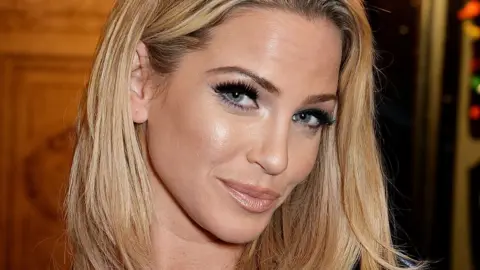 Getty Images
Getty Images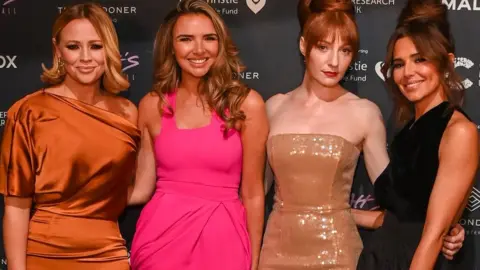 Getty Images
Getty ImagesLast year, Little Mix thanked Girls Aloud (as well as the Spice Girls, All Saints and Sugababes) when they became the first all-female act to win best British group at the Brit Awards.
It was something Nicola, Nadine, Kimberley, Cheryl and Sarah had been nominated for twice, losing out to Arctic Monkeys and Elbow.
Instead, Girls Aloud again relied on a public vote to finally claim a Brit in 2009 - winning best British single for The Promise. Having always lost out on categories judged by music insiders, the result reinforced that this was a group the British public not only created, but wanted to succeed.
Allow Google YouTube content?
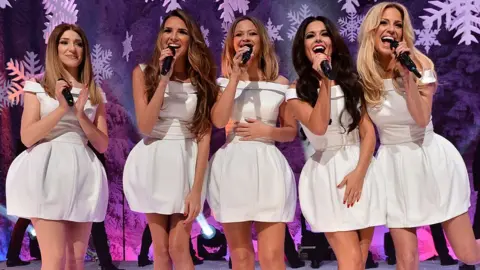
Last week I re-watched Popstars: The Rivals and, aside from the minimal production, some off-key performances and dated comments that made me squirm, there was one moment of innocence that stood out.
Kimberley, then 21, looked into the camera, hoping to get in to the final band but unsure of what was to come: "I think about how it's going to be, but I don't think any of us really know."
Twenty years on, she tells BBC News: "It's been an incredibly reflective year for us, for obvious reasons, and it still blows my mind how much support we have from the public, and how much love is still out there for our music."
On the day Sound of the Underground was released, BBC News reported: "Over two-thirds of this year's number ones have been from acts hand-picked and groomed for stardom by record company talent spotters, or from TV pop contests. Many are convinced the current fad isn't going to create long-term acts with back catalogues."
More than 20 singles, five studio albums, two greatest hits compilations and a collection of B-sides that can't be matched later, Girls Aloud really did prove everyone wrong.
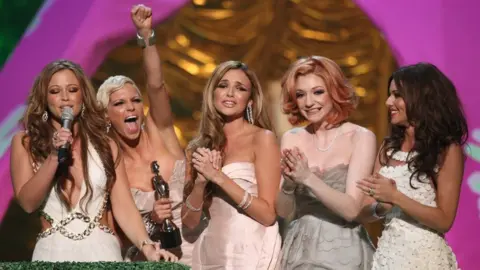 Getty Images
Getty Images